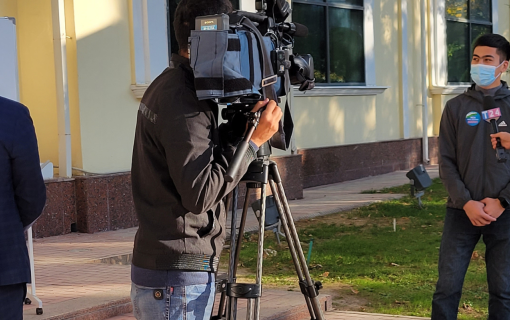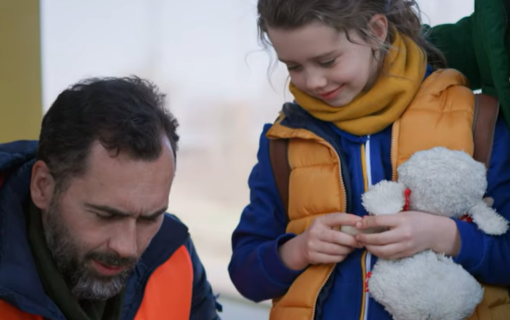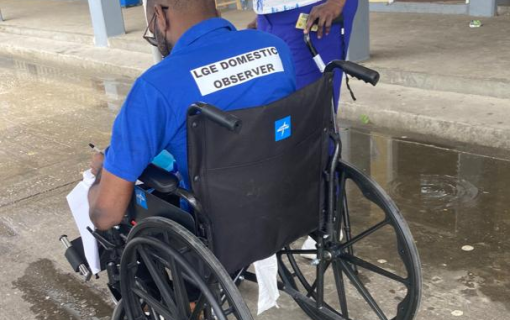Advancing Azerbaijan through Youth
For democratic values to prevail, it is important to instill them in the younger generation. In Azerbaijan, a group of youths founded OL! Azerbaijan - a non-political social youth movement that fosters independent thinking and personal responsibility - two important characteristics for a thriving democracy. Vugar Salamli, co-founder and Executive Director of OL! Azerbaijan and a 2012 IFES Humphrey Fellow, talks to IFES about the organization and why his country needs such a movement. He also provides insight into how to disseminate messages that resonate with youth, and the importance of being an example for others wishing to make a difference.
Please tell us about the OL! Azerbaijan Movement. What is its mission?
OL! Azerbaijan Youth Movement was established in 2006 by a group of activist students and some alumni from different universities within the country and from different European and American universities. The main purpose was to spread ideas of democracy and civic activism among the youth. For the last six years we have done different projects that focus mainly on education – educating youth and adults on the importance of democracy, knowing your rights, and being active in order to build a better society.
Would you please give us an example of projects you have done?
One of the main projects of our organization is called Free Thought University, which we have been implementing for the past three years. We are basically organizing lectures for young people and students on topics that are not available in a formal university. These are topics like human rights, freedom of expression and democracy. Through our lectures, we promote discussions on the importance of these values. For the last three years, we have organized more than 200 lectures. What is interesting about this project is that we are actually filming all our lectures and posting them on our website so people who did not or are not able to participate in our lectures can access them online.
There is a general perception that it is difficult to reach the youth and motivate them to participate or even be interested in these topics. Do you tailor your messages so they resonate with youth?
It is actually hard to work with youth groups, and it is especially hard to do so in countries like Azerbaijan where the economy is doing relatively well. We have oil revenue which provides youth the opportunity to work in different business corporations and small companies. Because of this, they are not as interested in participating in civil society. However, because of some serious problem in human rights and basically democracy, some young people are very interested in helping and working on these issues in order to create a better society.
Years ago, we came to realize that in order to attract youth that are open to being involved, whatever we do has to be done in a very creative and attractive way. So basically, we started to build our messages in ways that are more attractive to young people. We are one of the first organizations that started using social media in Azerbaijan. We started to shoot videos and upload them to YouTube almost five years ago when it was not popular in our country. We also started using Twitter a couple of years before the Arab revolutions. These activities have been a good example for other organizations that have started doing similar things. If you really want to be successful in countries like Azerbaijan where you do not have access to mass media, where you do not have free and independent TV channels and newspapers – you have to use social media. It is the only platform to send and spread messages. Due to the clutter of messages in social media, in order to be different, you have to organize your messages in effective, creative and different ways as well.
Do you work with organizations outside Azerbaijan?
Yes, we do, of course. We are working with different international donors, such as the American and British embassies, the National Endowment for Democracy and the German Marshall Fund, to give some examples. We also have partner organizations that work with us in different projects within the country and abroad.
If Azerbaijan had more youth activism or more youth participating in civil society, how do you think the country would be different?
The number of people who really want change and have the passion to make changes in the country is very small. I think things would be very different if we had at least 3-4 times more activism in Azerbaijan. We have serious problems when it comes to making recommendations to our government. We do not have a strong opposition. We do not have strong independent newspapers or business societies or groups that can give the government recommendations on reforms. That is why our government feels very comfortable in all their decisions - they do not get any feedback from society. If youth activism were several times stronger, government would start to think and listen to the recommendations of youth groups on how to build a better country.
You have done a great job at identifying a need in your country and forming an organization to address it. What advice do you have for other young people who also want to effect change in their societies?
The biggest impact you can have is by offering examples to the people. If you can give them success stories that they can replicate, it will create a bigger impact for the future of the country. Basically, what I would say to other young people in developing countries is to work on building positive examples for other youth groups.
When I was 20 years old back in the late 90s, we did not have good examples of youth activism in Azerbaijan, so we started to follow activism in Serbia, Ukraine, Georgia and other countries. We had to build everything from scratch in our country. But now people in Azerbaijan who are 10 years younger than us have success stories they can implement or improve upon. The best thing we can do for society is to give them success stories and good examples to replicate.









